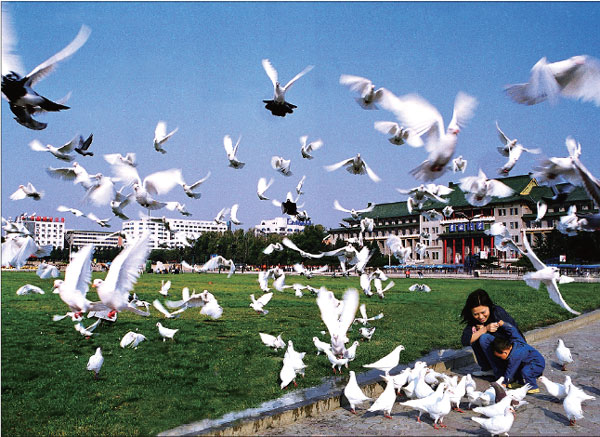Changchun advances 'city of happiness' plan
Improved traffic management provides a new lease on life in northeastern hub, Ye Jun and Liu Mingtai report.
On Dec 1, Changchun, the capital city of Jilin province, was honored with the title of "Chinese city with the highest sense of happiness" for the ninth consecutive year at a ceremony in Beijing.
Through the past year, Changchun's government and Party committee have worked to improve people's quality of life and build "a regional center metropolis in Northeast Asia".
The government started with the most direct and practical aspects that people are most concerned about: controlling traffic jams, curbing smog, upgrading the old city and accelerating the transformation of the city's economy.
Changchun has dramatically increased its number of parking spaces to bring more orderly traffic to the streets.
The number of automobiles crowding Changchun's streets has reached more than 1.1 million, increasing by an average of 100,000 per year and causing severe traffic jams.
At a city construction meeting earlier this year, Wang Junzheng, Changchun's Party chief and member of the standing committee of Jilin's Party committee, deployed measures to improve the city's construction and management skills.
Changchun's traffic jam management concentrated on providing more parking spaces. Logic dictated that the roads would be clear and the city would have greater capacity if people found it easier to park.
In half a year's time, the city cleared 843 streets and removed more than 100,000 obstructions to make room for parking spaces. The number of parking spaces increased from 3,850 to more than 330,000.
"In the past, traffic here was terrible and it was such a nuisance to even drive," said Tian Kun, owner of an electric-ity appliance store on Guangfu Road of Changchun. "But now traffic is in much better order."
Guangfu Road is one of the most famous shopping streets in Changchun, with numerous shops and many people visiting the nearby Museum of the Imperial Palace of "Manchukuo". Traffic flow in the area was always very high and people often parked randomly, leading to jams and harming the city's image.
Starting in April, Changchun united 18 government departments in the fight to ensure order on the roads.
The first step was to clear illegal road blocks.
"Illegal road blocks use public resources for private use. My administrative team members have worked overtime to end illegal occupation of parking spaces and street space," said Zheng Jian, a division chief of Changchun's city administration team. "As a result, there is more room for proper parking and the look of the city has improved."
The traffic administration has also considered the practicality of assigning parking spaces, so as to not take up sidewalks for the blind, prevent interference with normal traffic flow and avoid damaging the look of the city.
Other difficult areas such as Minkang Road, Guilin Road and Dama Road have also been cleared.
"I used to take my child to see the doc-tor at The First Hospital of Jilin University, and often could not find a parking space," said a resident with the surname Zhang. "I had to park in nearby small lanes and often had to fear getting a ticket."
Zhang needn't worry any more, because the places where parking was difficult now all have designated parking spaces.
Following the drastic increase of parking spaces, the city's traffic has been immensely improved, according to Changchun's information office. Proper parking rates reached 99.7 percent according to a recent investigation. Breaching of traffic rules has dropped 35.4 percent and road capacity has increased 8.9 percent in the past six months. The rate of traffic accidents has dropped 30.1 percent year-on-year.
Better traffic brings better order on the streets. Liu Lizhong, a 58-year-old traffic management volunteer, said: "This T-junction used to be really crowded and chaotic during rush hour in the morning. But nowadays it's been turned into a crossroad, and pedestrians are more willing to wait for the green light and use the crosswalk."
Managing traffic is not a one-time project. A new road traffic management guideline was discussed for the second time at the city's people's congress, and implementation is scheduled for the end of the year or early next year. The city hopes to maintain orderly traffic as a normal state of affairs.
Contact the writers through yejun@chinadaily.com.cn
|
A mother and child feed pigeons at the cultural square in downtown Changchun, capital of Jilin province. The city has adopted measures to bring citizens greater happiness.Provided To China Daily |
(China Daily 12/16/2016 page10)









